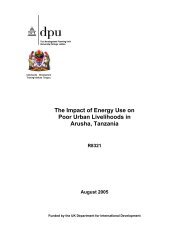EPA Review Annex Documents - DFID
EPA Review Annex Documents - DFID
EPA Review Annex Documents - DFID
You also want an ePaper? Increase the reach of your titles
YUMPU automatically turns print PDFs into web optimized ePapers that Google loves.
4. Perspectives on <strong>EPA</strong> negotiations<br />
In order to capture Ethiopia’s perspective regarding the use of resources by the locals who<br />
were involved in <strong>EPA</strong> negotiations, this section relies on the responses that were obtained from<br />
stakeholders by means of a questionnaire. The summary of responses or answers (Ans) from<br />
the questionnaires (Qns) that were distributed to the main stakeholders (mainly NDTPF<br />
members) who were involved in the <strong>EPA</strong> process is attached as <strong>Annex</strong> I. <strong>Annex</strong> VI (Names<br />
with*) indicates those interviewee NDTPF members. The detail analysis is in <strong>Annex</strong> I.<br />
5. Main lessons leant from negotiations<br />
The following are some of the main lessons that the country has learnt from the <strong>EPA</strong> process.<br />
i. Resource constraints: The country has been severely affected by resource constraints<br />
mainly in areas such as funding of sectoral studies and country negotiators in attending<br />
meetings (in most cases funds were provided for a limited number of negotiators per<br />
negotiation session even if the issues to be negotiated required different expertise).<br />
ii. Timeframes should not be a priority at the expense of substance: One of the main<br />
lessons learned with regards to the negotiation process itself is that deadlines for<br />
concluding negotiations should not be a priority at the expense of reaching an<br />
agreement on substantive negotiation issues. Rather, deadlines and conclusion of <strong>EPA</strong><br />
negotiations should be premised on achievement of mutual agreement on the<br />
substantive issues being negotiated.<br />
iii. Difficulty to reach consensus in a multi-diverse group: It is extremely difficult to reach<br />
consensus on any issue being negotiated in a multi-country group with diverse interests<br />
and level of economies. The ESA group comprises of 16 countries who decided to<br />
negotiate the <strong>EPA</strong> as one economic configuration even if the configuration has no legal<br />
base as an economic regional grouping. Aside from this, the group comprises countries<br />
of different levels of growth and economic interest. Out of the 16 countries 12 are LDCs<br />
and four are non-LDC. The economy of most countries in the group is based on<br />
agriculture, while for some the economy is based on industry, fishery and services. Such<br />
divers’ interest has impacted on the unity and strength of the countries during the<br />
negotiation.<br />
108
















